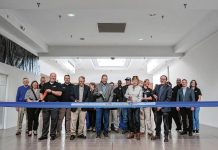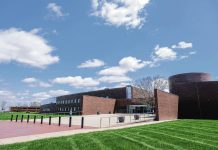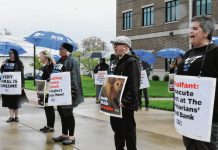Bartholomew County officials have blocked a proposed solar farm in northeast Bartholomew County after neighbors strongly opposed the project.
About 20 residents who live near the proposed project in Flatrock Township pleaded with members of the county’s Board of Zoning Appeals to consider the effect on their lives if 100,000 solar panels were added to 156 acres along County Road 900N between County Roads 350E and 425E.
The board sided with the neighbors, voting unanimously Monday to deny the petition after hearing more than an hour of testimony during a public hearing. The neighbors presented a petition with about 65 signatures and said there were other nearby residents who didn’t even know about the proposal.
The project was proposed by Vogel Solar LLC, Santa Monica, California, on land owned by Donald and Deborah Schroer, 4605 S. County Road 150W, application documents said.
Vogel Solar company representative Paul Cummings told the board the company was seeking a conditional use to build the solar farm, which also would involve building a utility substation and interconnecting with Duke Energy Indiana transmission lines that intersect with the property.
Cummings told the board that the facility would have a 6-foot security fence and routine maintenance, including mowing, with employees visiting the property to maintain the equipment. The company’s application said the solar facility would provide the landowner with an alternative to commercial or residential development and the panels could eventually be removed to keep the land intact for future agricultural use.
But the neighbors had a different view of what living next to a solar farm would be like.
Andy Sumerford, whose farm is about a quarter mile away, said he was approached about putting a solar farm on his property last summer and passed on it for a number of reasons. The company wanted a 30-year lease on the land, with an option to renew for 10 years, offering to rent the land at about $800 an acre, he said.
Saying he didn’t begrudge a property owner for taking a look at that, Sumerford pointed to potential downsides that could effect neighbors for decades.
Among the issues was noise, he said.
Several of the neighbors had visited a solar farm in Acton, in southeastern Marion County off Interstate 74, to listen to how much sound a solar farm generates.
Describing the sound as a distinct, high-pitched humming noise, Sumerford said it was audible from outside the security fencing.
A lengthy conversation ensued during the meeting about how many decibels would constitute a nuisance to the neighbors, with the neighbors contending that any high-pitched humming fit the description.
Carl and Mandy Messina, who live on the eastern boundary of the proposed project, also objected to the noise.
“If I can walk out my back door and hear a humming noise — that means I’m going to walk out of my house every sunny day for the next 20 years and hear humming,” Carl Messina said.
He also had concerns about birds being “fried” by the solar panels when they got too close, and the amount of heat that could be generated by the panels.
“To me, even if I wanted to relocate and someone wanted a rural setting, who would want to look up and see 100,000 solar panels,” he said. “It will be virtually impossible to relocate and start over.”
Another neighbor, Walter Gill, who lives about a half mile to the west of the proposed solar farm, had his wife Aubrie Gill and her twin sister Amber Robertson hold up a mural of the view from the Gill home, a wide expanse of farm land.
“I don’t think there is any question that allowing a solar farm will affect our property values,” he said.
Describing the solar farm as visual pollution, Walter Gill said the proposal would destroy many residents’ efforts to beautify their homes and keep their panoramic views.
“This is not an industrial setting for a solar farm,” Gill said.
Chris Schooley, another nearby resident, said toxic materials are used to produce solar panels. If those panels were damaged by hail or storms, it could send contaminated water into the wells serving the houses there, he said.
“In my eyes, solar panels are not an ag product,” he said.
Cummings said he was willing to sit down with the neighbors to come up with a compromise, perhaps increasing the buffer zone between the solar farm and nearby property. He refuted the claims about property values, telling the board that studies in other states had shown that proximity to a solar farm can’t be isolated as a factor in comparative pricing of homes.
Cummings also explained that the solar panels are designed to withstand golf ball-size hail and are engineered to withstand strong wind and tornadoes, although not an F5 tornado.
He reassured neighbors that components of the panels are sandwiched inside glass — and water cannot get to the components, so contaminants cannot leach into the soil from water getting inside the panels.
After the vote to deny the request, the neighbors applauded loudly.
Cummings shook hands with family members representing the Schroers and said he did not know whether the company would appeal or bring another request to the board.
“I think we’ll be back here,” Gill said. “I think they will refile.”
Sumerford afterward described the board’s decision as “democracy in action.”
“It’s about citizens participating in government,” he said.




